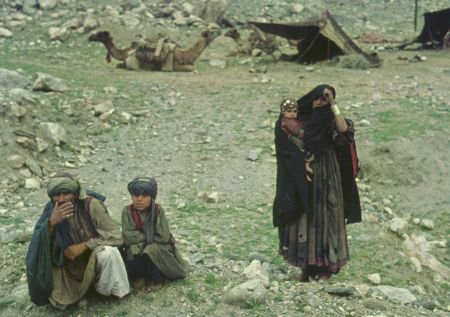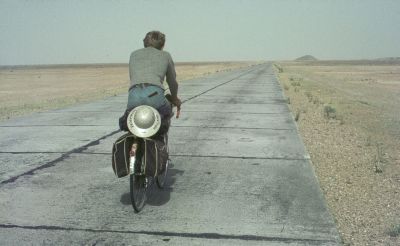| Barelds - Cycling around the world - Cycle stories - Asia, Africa, Europe, America | ||||||||||||||||||||
| home | site map | world | children | recent | cooking | dutch | german | react | ||||||||||||
Central-Asia and Europe 1969 (3).

Afghanistan: A nomad family in the mountains, the wife of which came begging for bread.
Ho, stop" someone shouted and came running out of his shack near the barriers with a book. "Register". We were standing at the foot of the mountain to make a tour through the Swat valley in the foothills of the Himalaya. It is an autonomous area inhabited by martial Pathans.
At the foot of the Khyber pass the same ceremony, and on top of this billboards saying "before sunset you must have crossed the pass". Wild and savage stories we had heard: you should not stop, everywhere there are shooting and threatening Pathans. In the barren mountains their villages lay scattered, fortresses of adobe (clay) with the houses inside. This desertlike area is thinly populated.
A puncture and later a broken cable forced us to stop. Armed men came toward us, cartridges belt around their waist and shoulders and quietly they looked at our repairs, greeting us friendly when we moved on again. At the picnic a passing nomad woman begged for a sandwich from me. Hoping that she would give it to the child on the donkey and not to the guys who walked with her, I gave it to her. The climb, 30 km, partly with steep hairpins partly gradually uphill was not too difficult, ample in time we reached Landi Kotal, the top. A busy small place full of dark little shops and teahouses, a truly smugglers nest. A dark figure came up to us, opened his hand and showed a brownish substance. "Want to buy ?" I said "no thank you, that is not necessary on a bike." Hash was sold openly.

Afghanistan: Fast "cycling" roads, constructed by the Russians, everybody wants to be their friends.
F
ortunately there was a bank at the Afghan border, the next city 1 ½ day cycling away from us and we had not bought any Afghan currency earlier, because there was no black market for it.The bank clark made us believe that he had no time to fill in the form and changed our money without it. Outside we realised that the exchange rate was too low and that this method was not correct. Henny went back into the bank and kicked a row. At a cry for help of the bank clark, the border guard rushed in, but the result was that the man filled in the form: with the wrong exchange rate which he had given us. The head office in Kabul, the capital, was very surprised and payed us the missing amount and promised to take measures.After Kabul we plunged into the real desert. Every day stages of far more than 100 kilometres and en route nothing but sand, stones, mountains and a good road as straight as a line through it. Going Southward as far as Kandahar, we met caravans and donkeys, everything packed and laden on their way to the mountains in the North. The women were wearing the beautifully worked nomad clothes and silver jewellery. We took pictures. Grandma Nomad grabs a bludgeon and comes toward us. "No", Henny points apologising and puts his camera away. "I only take a picture of that camel". The men make smile and the group flounders on. If we are lucky then there is, during our long daily stages on our way, a caravanserai. Sometimes we cycled 80 or 100 km without eating or resting.
Around a large, sandy square full of camels, horse and donkeys, adobe (clay) huts are situated, a few with arcuate porches. Within legs crossed on the mats Afghani are sitting with food and tea in front of them. As if every day cycling tourist pass by, we are judged by a hardly worthy glance when we sit down on the mats. We gobble our pulao rice and in addition a few pots of tea to quench the thirst.
| Start World around | Central Asia | << Previous | Next page >> | |||
| Barelds on bicycle through the world - Cycling in Asia, Europe, Africa, America | ||||||